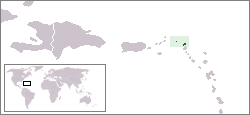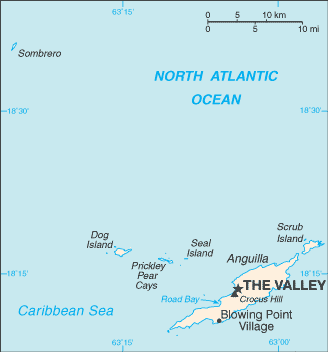Anguilla
2007 Schools Wikipedia Selection. Related subjects: Central & South American Countries; Countries
|
|||||
| National motto: Strength and Endurance |
|||||
| National anthems: God Bless Anguilla (unofficial); God Save the Queen (official) |
|||||
 |
|||||
| Official language | English | ||||
| Political status | Non- sovereign, Overseas territory of the U.K. | ||||
| Capital | The Valley | ||||
| Governor | Andrew George | ||||
| Chief Minister | Osbourne Fleming | ||||
| Area - Total - % water |
Ranked 220th 102 km² 39.4 mi² Negligible |
||||
| Population - Total |
Ranked 221st 13,477 (2006 est.) |
||||
| Currency | East Caribbean dollar | ||||
| Time zone | UTC -4 | ||||
| National Song | God Bless Anguilla | ||||
| Internet TLD | .ai | ||||
| Calling Code | 1-264 | ||||
Anguilla (English pronunciation: ang-GWILL-a) is a British overseas territory in the Caribbean, the most northerly of the Leeward Islands in the Lesser Antilles. It consists of the main island of Anguilla itself, approximately 16 miles long by 3 miles wide at its widest point, together with a number of much smaller islands and cays with no permanent population. The island's capital is The Valley. The total land area of the territory is 102 square kilometres (39.4 square miles), with a population of approximately 13,500 (2006 estimate).
History
Anguilla was first settled in pre-history by Amerindian tribes who migrated from South America. The date of European discovery is uncertain: some sources claim that Columbus sighted the island in 1493, while others state that the island was first discovered by the French in 1564 or 1565. The name Anguilla derives from the word for "eel" in any of various European languages (modern Spanish: anguila; French: anguille; Italian: Anguilla), probably chosen because of the island's eel-like shape.
Anguilla was first colonised by English settlers from Saint Kitts, beginning in 1650. The island was administered by Great Britain until the early 19th century, when – against the wishes of the inhabitants – it was incorporated into a single British dependency along with Saint Kitts and Nevis. After a 1967 rebellion and brief period as a self-declared independent republic, it became a separate British dependency (now termed a British overseas territory) in 1980.
Politics
Anguilla is an internally self-governing overseas territory of the United Kingdom. Its politics takes place in a framework of a parliamentary representative democratic dependency, whereby the Chief Minister is the head of government, and of a pluriform multi-party system.
The United Nations Committee on Decolonisation includes Anguilla on the United Nations list of Non-Self-Governing Territories. The territory's constitution is Anguilla Constitutional Order 1 April 1982 (amended 1990). Executive power is exercised by the government. Legislative power is vested in both the government and the House of Assembly. The Judiciary is independent of the executive and the legislature. Military defence is the responsibility of the United Kingdom.
Geography
Anguilla is a flat, low-lying island of coral and limestone in the Caribbean Sea, east of Puerto Rico. It is approximately 16 miles long by 3 miles wide. The soil is generally thin and poor, supporting only scrub vegetation.
Anguilla is noted for its spectacular and ecologically important coral reefs. Apart from the main island of Anguilla itself, the territory includes a number of other smaller islands and cays, mostly tiny and uninhabited. Some of these are:
- Anguillita
- Dog Island
- Prickly Pear Cays
- Scrub Island
- Seal Island
- Sombrero, also known as Hat Island
For a longer list see Geography of Anguilla.
Climate
Anguilla has a tropical though rather dry climate, moderated by northeast trade winds. Temperatures vary little throughout the year. Average daily maxima range from about 27°C (80°F) in December to 30°C (86°F) in July. Rainfall is erratic, averaging about 90 cm (35 in) per year, the wettest months being September and October, and the driest February and March. Anguilla is vulnerable to hurricanes from June to November.
Economy
Anguilla's thin arid soil is largely unsuitable for agriculture, and the island has few land-based natural resources. Its main industries are tourism and fishing, with the formation of offshore companies playing an increasingly important role in the economy.
Anguilla's currency is the East Caribbean dollar, though the US dollar is also widely accepted.
Demographics
The majority of residents (90.08%) are predominantly black, the descendants of slaves transported from Africa. Growing minorities include whites at 3.74% and persons of mixed race at 4.65% (figures from 2001 census).
72% of the population is Anguillian while 28% is non-Anguillian (2001 census). Of the non-Anguillian population, many are citizens of the United States, United Kingdom, St Kitts & Nevis or Jamaica.
Culture
The Anguilla National Trust, or ANT was established in 1993 to preserve the heritage of the island, including its cultural heritage. The Trust has programs encouraging Anguillan writers and the preservation of the island's history.
The island's cultural history begins with the Arawak Indians. Artifacts have been found around the island, telling of life before Europeans settlers arrived.
As throughout the Caribbean, holidays are a cultural fixture. Anguilla's most important holidays are of historic as much as cultural importance – particularly the anniversary of the emancipation (previously August Monday in the Park), celebrated as the Summer Festival. British holidays such as the Queen's birthday are also celebrated.
Rastafarianism
Anguilla is the birthplace of Robert Athlyi Rogers, author of The Holy Piby. The Holy Piby has a large influence on Rastafarian beliefs, and to this day many Rastafarian activists such as Ijahnya Christian of Anguilla have praised Rogers as a key shaker and mover of the faith. Today, there are many "rastas" living on the island, and the influence of the religion spreads even to those who are not a member of it.
Music
hjghjg
Other topics
- Communications in Anguilla
- Transportation in Anguilla



